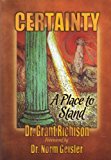Certainty—A Place to Stand: Critique of the Emergent Church of Postevangelicals. By Grant Richison. Pickering, Ontario: Castle Quay Books, 2010. 320 pp. Paper, $27.95.
Rarely have I read a book that moved me as much as this one. The title itself is moving: Certainty—A Place to Stand. In our postmodern culture nothing is certain, especially in the emergent church movement. Not only is certainty of our eternal security denied, but so is certainty about the resurrection of Jesus, the existence of God, and even our own existence.
The first five chapters deal with the problem of uncertainty in our culture and in many churches today. Chapters six through ten cover the propositions of Scripture as the source of certainty. Chapter eleven is a bit of a review, discussing the identity that many Evangelicals have today and the identity that Evangelicals should have. The final chapter deals with how we reach postmoderns.
JOTGES readers should find encouragement in Richison’s suggestion that to reject certainty is a perversion of belief (p. 71), that the idea of faith as a “personal encounter” as opposed to persuasion of the truth of Scripture is spiritually dangerous (pp. 69-70): “Spirituality without propositions from the Word will produce Christian living without mooring. Everyone will do what is right in their own eyes” (p. 70), that subjectively interpreting Scripture in light of what it means “to me,” as opposed to what the author intended it to mean, changes the Bible from God’s Word to our word (p. 65), that mysticism is a way for those who have rejected propositional revelation to find a different path to spirituality and to meaning and purpose in life (p. 107), that it is a perversion of the gospel to say that “people become Christians by association with the church [the postevangelical view] rather than by the proclamation of the church” (p. 93), and that the ideas of degrees of faith actually destroys the Christian faith (p. 259, though see p. 19 where he makes the contradictory statement that “certainty admits degrees” and pp. 257-58 where he speaks of three types of certainty, philosophical certainty, confidence as certainty, and moral certainty, and only the third of these is actually certain, though fortunately “this kind of certainty is the certainty of Scripture,” p. 258).
Richison is not writing to deal with the issue of what one must believe in order to be born again. However, he does touch on this issue from time to time and JOTGES readers will likely wish he had been clearer in his answer. Here are some of the ways he explains what we must believe to be born again: “trust Christ as Savior” (p. 259, unexplained as to what this means), “trust in the sufficiency of Christ’s work on the cross to save” (p. 248), believe “that Jesus died on the cross in the place of our sins and that by faith in his work we have the forgiveness of sins” (p. 299), believe that “Jesus is the only answer for eternal salvation” (p. 306), believe that “forensic justification [is] by faith alone” (p. 277), and believe that “salvation by works is not good news…because then salvation would depend on us, not Christ” (p. 158). Nowhere do we find a clear statement that says that one who believes in Jesus has everlasting life that can never be lost, is eternally secure, is justified once and for all, or anything like that. The author fails to discuss what John Piper calls what we believe in Jesus for. However, since I am not looking for Richison to even address this issue, let alone address it clearly, I am not particularly bothered by this lack. Indeed, the fact that he doesn’t promote Lordship Salvation is quite encouraging.
I close with a summary by Richison of what he is saying: “Postmoderns are changing the doctrinal content of evangelicalism because they are caught up in culture; culture dominates their doctrine. Evangelicals are gradually losing their identity by losing commitment to truths of Scripture. The badge of identification is no longer biblical belief but ‘spiritual experiences.’ This anti-truth mentality is a desire for assimilation and accommodation to culture. They do not want to be viewed as people at odds with the prevailing ideas of society. The question at hand is, Do we allow culture to set the agenda, or does the Word of God set it?” (p. 279).
Amen.
I strongly recommend this book.
Robert N. Wikin
Editor
Journal of the Grace Evangelical Society
Denton, Texas


